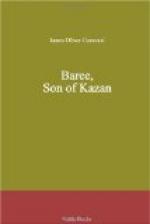It was a wonderful night. The moon was straight overhead, and the sky was filled with stars, so that in the open spaces the light was almost like that of day, except that it was softer and more beautiful. It was very still. There was no wind in the treetops, and it seemed to Baree that the howl he had given must have echoed to the end of the world.
Now and then Baree heard a sound—and always he stopped, attentive and listening. Far away he heard the long, soft mooing of a cow moose. He heard a great splashing in the water of a small lake that he came to, and once there came to him the sharp cracking of horn against horn—two bucks settling a little difference of opinion a quarter of a mile away. But it was always the wolf howl that made him sit and listen longest, his heart beating with a strange impulse which he did not as yet understand. It was the call of his breed, growing in him slowly but insistently.
He was still a wanderer—pupamootao, the Indians call it. It is this “wander spirit” that inspires for a time nearly every creature of the wild as soon as it is able to care for itself—nature’s scheme, perhaps, for doing away with too close family relations and possibly dangerous interbreeding. Baree, like the young wolf seeking new hunting grounds, or the young fox discovering a new world, had no reason or method in his wandering. He was simply “traveling”—going on. He wanted something which he could not find. The wolf call brought it to him.
The stars and the moon filled Baree with a yearning for this something. The distant sounds impinged upon him his great aloneness. And instinct told him that only by questing could he find. It was not so much Kazan and Gray Wolf that he missed now—not so much motherhood and home as it was companionship. Now that he had fought the wolfish rage out of him in his battle with Oohoomisew, the dog part of him had come into its own again—the lovable half of him, the part that wanted to snuggle up near something that was alive and friendly, small odds whether it wore feathers or fur, was clawed or hoofed.
He was sore from the Willow’s bullet, and he was sore from battle, and toward dawn he lay down under a shelter of some alders at the edge of a second small lake and rested until midday. Then he began questing in the reeds and close to the pond lilies for food. He found a dead jackfish, partly eaten by a mink, and finished it.
His wound was much less painful this afternoon, and by nightfall he scarcely noticed it at all. Since his almost tragic end at the hands of Nepeese, he had been traveling in a general northeasterly direction, following instinctively the run of the waterways. But his progress had been slow, and when darkness came again he was not more than eight or ten miles from the hole into which he had fallen after the Willow had shot him.




